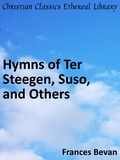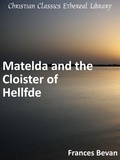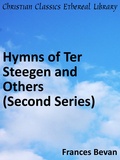Frances Bevan
Hymn translator and poet
Biography
(Emma) Frances Bevan was the daughter of the Right Rev. Philip Nicholas Shuttleworth, sometime Bishop of Chichester. She was born on Sept. 25th. 1827, at Oxford. On April 30th. 1856 she married Robert Cooper Lee Bevan, banker of Fosbury Manor, Wilts. and Trent Park, Middlesex. She died in her own house, 'Chalet Pasiflora', Cannes, on Feb. 13th. 1909, and was buried at Cockfosters, Herts., being interred in the family vault in the church outside Trent Park.
The hymns of Frances Bevan are chiefly translations from German Pietists (so-called) of the Middle Ages. There is found in them that mystical touch, that indefinable quality (also found in the hymns of J.N. Darby) that reached the inmost recesses of the soul, and calls for the deepest language of the spirit. By her beautiful translations, Mrs. Bevan has taught us something of that wealth of hymnology found in the German language; and in her interesting prose works "Three friends of God", "Sketches of the Quiet in the Land", [and "Trees Planted by the River", F.W.] she has drawn aside the curtain and revealed the atmosphere and environment of the hymnists themselves.
She says, "How distinct was their witness to the truth of the Gospel may be early seen by comparing their writings with those of the true servants of God who remained under the influence of Roman Catholicism only. A comparison of Thomas àKempis with Johann Tauler will serve as an instance of this contrast. In the case of the latter the present possession and enjoyment of eternal life; in the case of the former an earnest and true desire to attain that possession. In the latter, peace and joy, the starting point; in the former, the goal to be reached by strenuous effort". The translations of Mrs. Bevan have exercised a deep influence upon the hearts of those to whom her poetry more particularly made its appeal, i.e. those with whom she was linked in assembly fellowship.
Mrs. Bevan's first volume of verse was published in 1858 as "Songs of Eternal Life"; but it was too bulky and costly to command a large sale; it consisted of translations only. Her second volume came out in 1859 as "Songs of Praise for Christian Pilgrims", but later on in her life she no longer regarded this series with approval. Her third volume appeared many years later (1884) as "Service of Song in the House of the Lord". These three books are now out of print. Ten years later (1895) "Hymns of Ter Steegen, Suso and Others" was published; soon followed by the second series as "Hymns of Ter Steegen and Others"; these two books containing the best that had already come out. Mrs. Bevan's last poetical work, "Come, a Selection of Gospel Hymns" is dated 1902, but does not reach the excellence of those written earlier. Among her prose works, linked up with Church History, are two valuable little biographies, "The Life of William Farel" and "The Story of John Wesley". When Mrs. Bevan was born at Oxford in 1827, her father Philip Nicholas Shuttleworth was Warden of New College. In 1842 he became Bishop of Chichester, but died two years later, leaving her fatherless at seventeen. He was opposed to Puseyism and wrote "Scripture not Tradition", a work of "great force and learning".
When a girl, Mrs Bevan was taught by a German governess, and became interested in Gothic art and medieval Christianity; and later on she was much attached to the family of Baron von Bunsen, at one time Prussian ambassador to England, whose scholarly attainments largely influenced her study of German literature.
Mrs. Bevan has given us glimpses of her own life story in two little biographies she has written, "Reminiscences of Ada Frances Bevan" is the touching story of her eldest child, taken from her at the age of four. The other biography, "Recollections of R.C.L. Bevan", is a memoir of her husband, a Christian banker, whose leisure was given so simply, yet fruitfully to God. In this narrative, we read that Frances Shuttleworth (as she was then) came to the house of Mr. Bevan to Bible Readings that made a lasting impression on her, being then 27 years of age; and Mrs. Bevan goes on to say, "As time passed on, I was no more a visitor but at home in his home". She was married to Mr. Bevan when 29, and 3 sons and 6 daughters were born into that happy household.
Notes from "Songs of Pilgrimage and Glory" by E.E. Cornwall.



